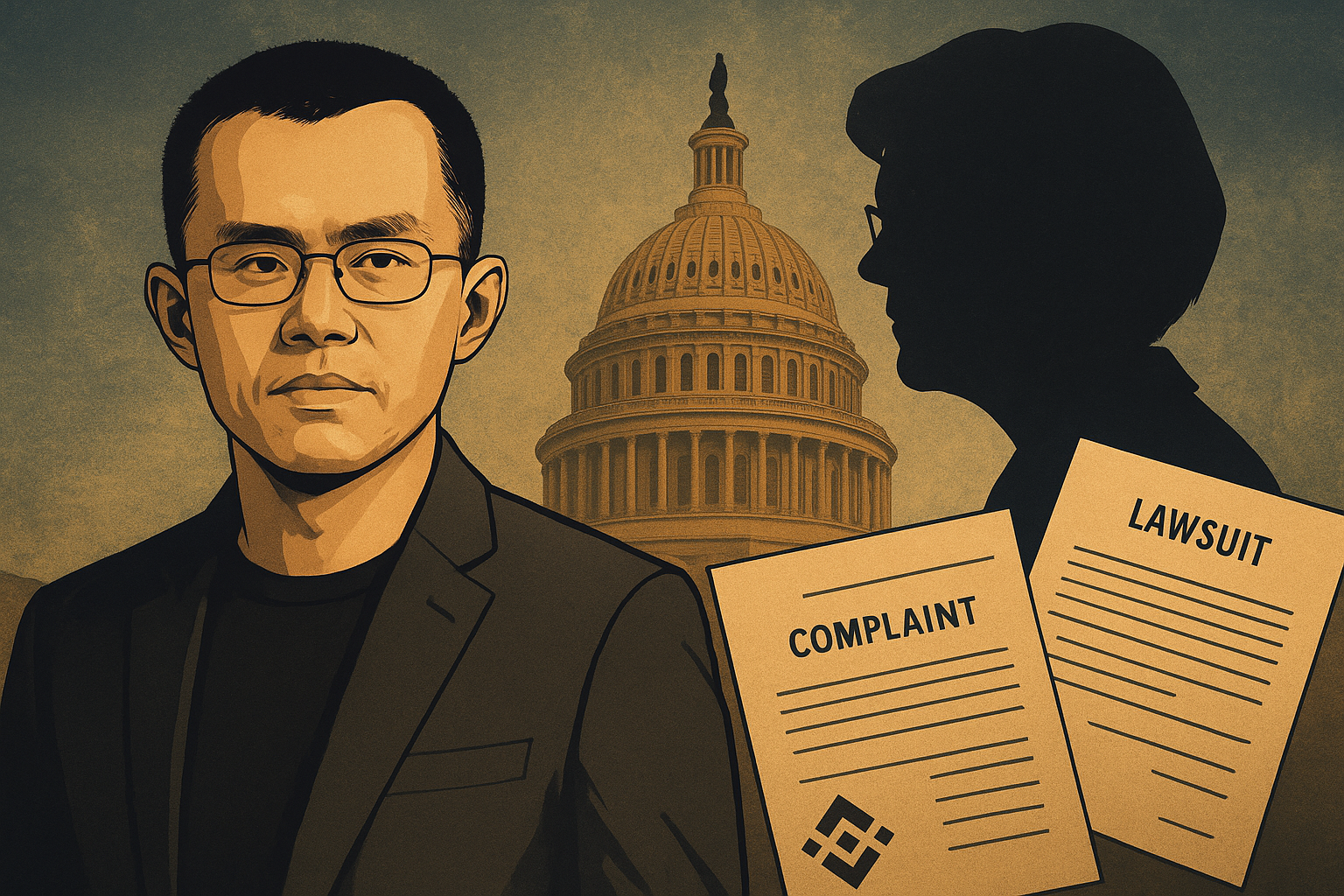In a fresh chapter of the ongoing tension between Washington and the crypto industry, former Binance chief Changpeng “CZ” Zhao is reportedly preparing to sue Senator Elizabeth Warren for defamation over public statements accusing him of criminal money laundering and corruption involving former US President Donald Trump.
According to a report by the New York Post, Zhao’s attorney Teresa Goody Guillén, a partner at Baker & Hostetler, confirmed that the Binance founder intends to pursue a libel suit unless Warren retracts her remarks. The comments in question were made on Oct. 23 in an X (formerly Twitter) post that followed Trump’s presidential pardon of Zhao.
In her post, Warren claimed Zhao had “pleaded guilty to a criminal money laundering charge,” language that, according to Zhao’s legal counsel, is both factually incorrect and reputationally damaging.
Zhao’s defense maintains that while he did plead guilty in November 2023 to a Bank Secrecy Act violation—specifically, failing to maintain an adequate Anti-Money Laundering (AML) program—he was never charged with money laundering itself. The plea resulted in a four-month prison sentence, which he served in 2024.
“Mr. Zhao will not remain silent while a United States Senator seemingly misuses the office to repeatedly publish defamatory statements that impugn his reputation,” Guillén said, according to The Post.
“Mr. Zhao respectfully requests an immediate retraction of these false statements, both within the congressional resolution and on X. He reserves all legal remedies available to address this matter.”
The Trump Connection and USD1 Stablecoin Controversy
The situation intensified after Trump’s decision to pardon Zhao, a move that triggered bipartisan scrutiny in Washington. Critics questioned whether the pardon was influenced by Abu Dhabi–based investments linked to Trump’s circle.
Reports suggest that an investment firm tied to the World Liberty Financial (WLFI) ecosystem, the issuer of the USD1 stablecoin, had invested $2 billion into Binance prior to the pardon. WLFI is a crypto venture reportedly associated with Trump’s family and allies, which many see as part of his broader pro-crypto positioning heading into the 2024 election cycle.
In her X post, Warren claimed Zhao had “financed President Trump’s stablecoin,” calling it “corruption,” a statement that appears to have sparked Zhao’s legal response.
The Binance founder quickly replied online, stating,
“There were no money laundering charges. Senator Warren can’t get her facts right.”
Zhao’s response mirrors a growing sentiment among crypto executives who argue that regulators and lawmakers have weaponized narratives of financial misconduct to justify aggressive oversight of the digital asset industry.
Legal Background and Reputation Defense
Zhao’s potential lawsuit would mark another attempt to protect his personal and professional reputation after years of regulatory confrontation.
In November 2023, Binance agreed to a $4.3-billion settlement with US authorities, including the Department of Justice (DOJ) and Commodity Futures Trading Commission (CFTC), for AML and sanctions violations. While Zhao admitted responsibility for compliance failures, the DOJ explicitly stated that Binance’s offenses did not involve direct laundering of criminal proceeds.
Legal experts suggest that Warren’s wording conflating compliance failure with money laundering could meet the standard for defamation if proven false and damaging. However, since the remarks were made by a sitting US senator, Zhao’s legal team may face additional hurdles due to legislative immunity and First Amendment protections.
Still, by signaling the potential lawsuit, Zhao appears intent on challenging the political framing of his conviction and the ethics narrative surrounding Trump’s decision to pardon him.
A Familiar Legal Battlefield
This is not the first time CZ has taken on major media or political figures over what he considers defamatory claims.
In 2022, Zhao sued Bloomberg Businessweek’s Hong Kong edition for publishing an article that allegedly portrayed Binance as operating a Ponzi scheme. The magazine later issued a public apology in 2024 and donated to charity as part of a confidential settlement.
Earlier in July 2025, Zhao also threatened legal action against Bloomberg again for suggesting Binance had developed the smart contract code for USD1, the stablecoin tied to Trump’s business ventures. That report implied that Zhao had been negotiating a presidential pardon as part of the deal, a claim his lawyers described as “wholly fabricated.”
Such disputes underscore the intensifying overlap between crypto, politics, and media narratives, particularly in the wake of Trump’s renewed embrace of digital assets during his presidential campaign.
Political Ramifications in Washington
The controversy comes amid renewed debate in Washington over crypto influence and political ethics. Senator Warren, a longtime critic of the digital asset industry, has led several legislative pushes to tighten AML standards and restrict banks from servicing crypto firms.
Her critics argue that she is reviving the “Operation Chokepoint 2.0” dynamic, an alleged coordinated effort by US regulators to limit crypto’s access to banking infrastructure.
Warren’s office has not commented on the potential lawsuit, and the senator’s X post remains live, though it now features community-added context clarifying that Zhao was convicted for failing to implement AML controls rather than for money laundering itself.
Legal analysts say Zhao’s move could embolden other crypto leaders who believe their reputations have been unfairly tarnished by political rhetoric. However, they caution that suing a US senator presents unique jurisdictional and constitutional complexities, potentially extending litigation over several years.
Broader Implications for the Crypto Industry
The standoff between CZ and Senator Warren reflects a larger ideological clash over the future of crypto regulation in the United States.
Trump’s administration has openly courted digital asset firms, positioning crypto innovation as a national competitiveness issue, while Warren and her allies have emphasized consumer protection and anti-corruption frameworks.
Zhao’s case could therefore set a precedent for how crypto leaders navigate political attacks and how far free speech protections extend when elected officials make potentially damaging public statements.
If the lawsuit proceeds, it may also force a public examination of the links between politics, capital flows, and stablecoin ecosystems, including WLFI and its USD1 token.
The Media and Market Reaction
Following reports of the potential defamation case, CZ’s name briefly trended on X, with supporters framing the situation as part of a “media smear campaign” against crypto’s most prominent figures.
Others, however, cautioned that the controversy could distract from broader issues, such as Binance’s ongoing compliance reforms, global expansion under new leadership, and industry-wide efforts to rebuild trust after years of enforcement actions.
Meanwhile, Binance Coin (BNB) saw modest volatility but no significant price impact following the news. Market analysts described the story as “political rather than structural,” unlikely to alter Binance’s long-term positioning.
A Reputation at Stake
For Zhao, who remains one of the most recognizable figures in crypto, the defamation threat appears as much about vindicating his personal integrity as it is about challenging the political narrative surrounding his legal history.
Despite stepping down from Binance in late 2023 and serving time in 2024, Zhao has retained significant influence across the digital asset ecosystem, including ventures in education, blockchain infrastructure, and philanthropy.
If his legal team proceeds, the case could become one of the most closely watched political-legal battles in crypto history, testing the boundaries of accountability between elected officials and private-sector innovators in the post-pardon era.





